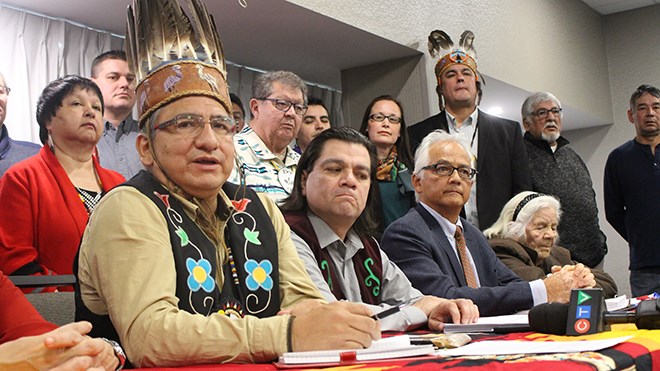A recent announcement regarding the Robinson-Huron Treaty annuities case has Chief Dean Sayers of Batchewana First Nation feeling a little more at ease, especially in light of the upcoming federal election.
The 21 signatories of the Robinson-Huron Treaty of 1850 have been in court since a 2018 decision in favour of the signatories, one that the provincial government appealed. Both stages of that appeal are complete but the decision has yet to be rendered. The federal government, however, decided against appealing.
And now, the correspondence recently received by the signatories states that regardless of the party behind the new Canadian government, the decision will not be appealed.
Sayers said that he considers this to be one of the “building blocks” that will lead to the province finally settling the case.
“When I think of it as non-partisan, my thought would be that, regardless of whoever comes into government, whether it's a Liberal or Conservative government, they have the obligation to implement this augmentation clause, regardless of their party,” said Sayers.
He also believes that there will be a more “compelling need” on the part of the province to settle before decisions come in the appeals case.
“This really puts us in a nice position to be able to say, ‘Ontario, the writing's on the wall, there's two court decisions that were not aligned with how you perceive history’.”
Sayers said he would like the “decision-makers” of the provincial government to “take a good look at everything,” including Justice Patricia Hennessy’s 2018 decision. “I'm not sure how much the information and the perspective that gets to them is really aligned with what's happening in the court,” said Sayers. “If they had the chance to take a good look at Justice Hennessey's decisions, at the spirit of the intent that you can find within there, I think we'd see a different course with both governments.”
He hopes that the people of Ontario will also take a look at the decision.
The Robinson-Huron Treaty of 1850 Annuities Statement of Claim, which was launched by the RHTLF in 2014, involves a claim for resource revenues. In the mid-1800s, settlers in the area were driving economic growth on land that did not belong to them and were encroaching on traditional lands.
Working within a framework that they understood, the sharing of resources for common good, the First Nations of much of northeastern Ontario entered into a treaty with the Crown, as represented by William Benjamin Robinson, a former mine manager who was named treaty commissioner.
Under the treaty, the Crown promised to pay a perpetual annuity of £600 ($2,400), which in 1850 worked out to approximately $1.60 per person. But Robinson provided an additional incentive for the Anishnawbek communities to sign the treaty.
It is called an ‘augmentation clause’ and it reads “[...] should the Territory hereby ceded [...] at any future period produce such an amount as will enable the Government of this Province, without incurring loss, to increase the annuity hereby secured to them, then and in that case the same shall be augmented from time to time.”
Basically, if further wealth was generated in the territory, the Crown is obligated to increase the annuity “to such further sums as Her Majesty may graciously be pleased to order.”
However, the Crown has felt no such obligation — until forced to by the court.
The December 2018 decision, handed down by Hennessy, held that “the Crown has a mandatory and reviewable obligation to increase the Treaties’ annuities when the economic circumstances warrant.”
Sayers hopes that the people of Ontario will gain an understanding of what happened, as well as understand what the annuities from this claim will mean to the northern Ontario-based First Nations. Sayers said the settlement will provide economic stimulation for the area, especially after the effects of the pandemic.
“First Nations people are not going to be investing in Switzerland, or putting their money in a bank somewhere out there,” said Sayers. “It’s local economies that are going to benefit; Sault St. Marie, North Bay, Sudbury, even Thunder Bay and all the way through to Parry Sound, places where there is a struggling economy, so I think it's a great injection.”
Sayers also said he is impressed with the Indigenous initiatives from the signatory nations and those from across the country.
“I see a lot of opportunity for economic partnerships, looking at expansion of the natural resources industry, we're looking at it in our communities here,” said Sayers. “But we can even be better involved with some capital equity, that's always a big need.”
The need is made more difficult to meet as typical collateral needs can’t be met.
“First Nations are unique, because you can't use land as your collateral,” said Sayers. “So this would provide another option around how we can be participating even more so in a fruitful economy.”
Sayers said the sky's the limit for the people and as nations.
“This makes it much more of an equal playing field,” said Sayers.
As well, to aid in with disbursement of any settlement, the 21 nations have already planned for it.
“There are disbursement agreements that we've already put in place, developed formulas where the chiefs have agreed and that will benefit members and individuals as well,” said Sayers. “But we expect there will be a lot of economic development that will be generated through this eventual settlement.”
You can read more about the Robinson Huron Treaty litigation by visiting RobinsonHuronTreaty1850.com.



